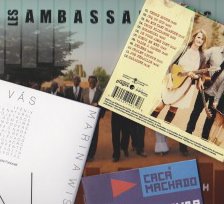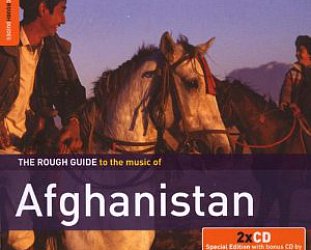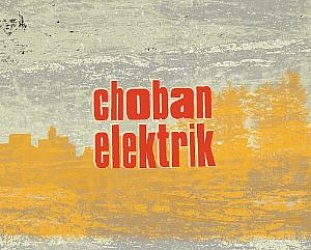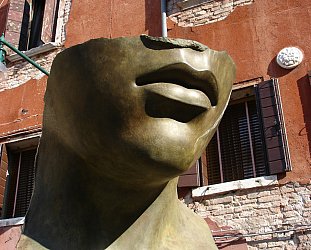Graham Reid | | 2 min read
Serpente by Marina Wisnik (from the album Vas)

Because Elsewhere is one of the few mainstream websites which has no problem writing about world music in the same space as pop, rock, jazz, reggae and whatever, we have been increasingly inundated with world music albums for review. From "elsewhere" as you might expect.
So this occasional column -- in the manner of Short Cuts about New Zealand pop/rock etc releases and In Brief about international pop/rock etc albums -- will attempt to bring some of these albums to your attention.
We presume no prior knowledge on your part of the languages spoken (Wolof is not used in our household) but will try to comment intelligently, if briefly, on them.
For more world music at Elsewhere see here.
Marina Wisnik: Vas (Circus): This Brazilian singer and songwriter has an appealingly lazy, sometimes post-coital voice but on a cursory hearing this might sound like more of that laid-back Latin sound where a folksy sophistication and almost horizontal vibe is so common. But there are interesting layers here (the subtle organ parts, offbeat percussion) and a very sly pop sensibility (Quem Podera, Para O Nada) and by the time you get to the classy Swinging Sixties sound of Mais Real just past the halfway point you'll click that there's actually a lot going on here, albeit in a way that doesn't draw attention to itself. And the second half -- with wah-wah and slightly threatening rap on the seductive Serpente -- is more musically adventurous than the first, and Wisnik explores a greater range. Well worth taking time with. Go here to listen, download and find out more.
Vishten: Terre Rouge (Plages): The "red dirt" of the album title refers to the earth of Prince Edward Island on the east coast of Canada where, many generations ago, the French established a colony named Acadia. Thereafter the British arrived (invaded) and many Scots settled there . . . so the music is trickledown of those influences. This multi-instrumentalist Francophone trio who sing and play guitar, fiddle, mandolin, accordion, bodhran, piano and such here go back to their Acadian roots for an album of trad.folk originals configured as reels, jigs and songs given a contemporary beef-up (synths, recent events like this year's blizzards, the link to the Acadians who fled to Louisiana on the cajun party song Joe Feraille). You do have to like a lot of fiddle, jigs and reels (frankly Elsewhere gets pretty ho-hum after two) but the up-tempo dance songs are throughly enjoyable. A tip for the cautious: reverse the running order and start with the two foot-stompers and the lively Chalet Groove. On a good day at a Womad, wethinks. For more go here.
Les Ambassadeurs: Rebirth (World Village/Ode): Something to know: Because Elsewhere has been inundated by requests and demands from rock, pop and other artists wanting reviews of singles and EPs, we long ago drew a line because there were so many full length albums commanding our attention. We even have a polite form letter in that regard. But those people aren't watching so let's consider this which came our way (from New Zealand's Ode) . .. and it's something special. This four-song 10" EP in a gatefold sleeve finds the great albino musician Salif Keita going back to Mali and hooking up again with old pals and Seventies members of Les Ambassadeurs, not to revisit glory days (this isn't post-punk band members getting together to pay for their kids' schooling) but to raise funds for Keita's foundation which helps young albinos (whose skin get cancer-ridden under African sun, not to mention the babies sometimes slaughtered by witchdoctors). A worthy cause, elevating music, lotta pleasure. Available through Marbecks in Auckland and I guess good record stores nationwide.
And be persuaded by this . . .
Tielcolomba He
Caca Machado: Eslavosamba (Circus): From the same studio source as Marina Wisnik (above) comes this album by what might seem her male counterpart, the guitarist and occasional singer Caca Machado, although his low-level style is located in something akin to a more subdued post-tropicalia sound, and he gets assistance from other singers, notably Celso Sim most effectively on the Latin-noir disturbance of O Funambulo. And the bent instrumental Pagode Polaco walks confidently if briefly into a Weill/Waits cabaret in some strange Sao Paulo club in the Forties. But this is a bit musically haphazard for non-Latin listeners, although at least a third of these 12 songs are . . . . Well, they are "different", in a good way.
Try this.
Casual ft Na Ozzetti
.
.
.







post a comment